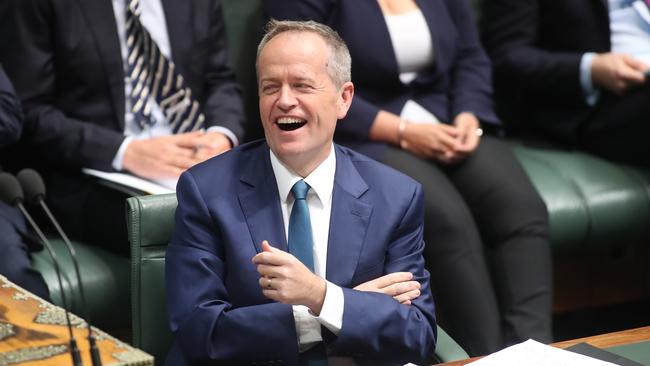Bill Shorten’s power play debunked
Bill Shorten’s claim that the electricity crisis has been driven by privatisation has been dismissed by energy experts.

Bill Shorten’s claim that the electricity crisis has been driven by privatisation has been dismissed by business leaders and energy experts, and prompted accusations from a former NSW Labor treasurer that the Opposition Leader is abandoning the Keating government reform agenda.
Former Business Council of Australia president and 2014 National Commission of Audit chairman Tony Shepherd dismissed Mr Shorten’s attack on private-sector energy companies, declaring that the crisis was “not a failure of markets” but “a failure of governments’’.
The nation’s energy regulator this week called for the creation of a power reserve to prevent the heightened risk of blackouts and brownouts this summer in Victoria and South Australia and the potential for power shortfalls in NSW if the AGL-owned Liddell coal-fired station is shut, as scheduled, in 2022.
Rising electricity and gas prices have sparked warnings from leading companies that jobs and investment will be threatened and costs will be passed on to consumers through higher prices.
Mr Shorten used an ABC radio interview to argue that the privatisation of electricity assets in the 1990s had seen the nation lose control of prices and to claim that a “ruthless pursuit of profits’’ by energy companies was hurting the nation.
“There is no doubt that privatisation has been a big problem and I think the debate in Australia needs to recognise that,’’ he said.
Former NSW Labor treasurer Michael Costa, who resigned his position in 2008 when he and then premier Morris Iemma failed in their bid to privatise the NSW electricity generators and retailers in the face of trade union opposition, accused Mr Shorten of “ignorance’’ and abandoning Labor’s blue-collar base.
“Bill Shorten doesn’t understand electricity markets or markets in general … prices reflect the distortions that governments have created,’’ Mr Costa said.
“Bill should remember the electricity market reforms were started by the Keating government. He is sounding more and more like a left-wing socialist ideologue. Labor’s 50 per cent renewable energy target is a further betrayal of blue-collar workers and will lead to the deindustrialisation of Australia.’’
Mr Shepherd told The Australian the electricity market was set up on a basis that had “no recognition of the capacity to deliver power consistently”, so the rise of renewable energy had made coal and gas less competitive. This had resulted in less investment in coal and gas generation and a “steady decline in baseload capacity”.
“Unfortunately these market arrangements had led to a doubling of the cost of electricity for the average consumer and serious issues in their reliability and availability,” Mr Shepherd said.
“The solution is not renationalisation but correction of the fundamental flaws in the market and the market rules as established.”
Former Victorian premier Jeff Kennett said Mr Shorten had proved he was “yesterday’s man, with yesterday’s ideas and he has absolutely no relevance to Australia in 2017, and sadly he has absolutely no relevance for Australia into the future’’.
Mr Shorten last week singled out Victoria as an example where privatisation had failed. “What happened is that these electricity generators were sold at a very high one-off price and the private operators, ever since then, have been basically trying to screw down costs and bleed these assets to recoup some of the money they paid for it,” Mr Shorten said.
“So I think the privatisation has been a net-negative in electrical generation and I think that we’re seeing some of the problems with privatisation come home to roost in 2017.”
Mr Kennett, who privatised Victoria’s electricity assets in the 1990s, slammed Mr Shorten’s “ignorant” claim that electricity privatisation was a failure, declaring it showed the Labor leader was “totally incapable” of leading Australia.
“It is not that privatisation was wrong; it is the failure of governments since then to work with the private sector to develop an industry that was going to meet the needs of the Australian community,” Mr Kennett said.
Electrical Trades Union NSW secretary Dave McKinley backed Mr Shorten’s attack on privatisation, declaring it had “failed the people of Australia” and resulted in “higher prices and a loss of control over an essential service”.
ACTU president Ged Kearney took to Twitter to back Mr Shorten’s call for a debate on the privatisation of electricity assets. “Privatisation was a big mistake — and still is! We definitely need a conversation about it,” she said.
ACTU secretary Sally McManus said privatisation had been a major contributor to the cost of living for working people by pushing up power bills. “We are really worried about the issue of energy,” she told Sky News.
“We think it’s affecting workers’ living standards. Privatisation has been a really big contributor to rising energy costs on everyone, on working people.”
In a statement, the Business Council of Australia said the energy crisis was the result of “government policy failures, not industry decisions”.
“Australia’s energy sector has been subjected to numerous haphazard government interventions including overlapping state and federal renewable energy targets, a poorly designed carbon tax, and state moratoria on developing gas reserves that have thrown scientific advice out the window,” the BCA said.
Grattan Institute energy director Tony Wood rejected privatisation as the cause of the energy market crisis. He said 15 years of political disagreement on climate change policy and regulated monopolies in the electricity distribution networks were contributors to the current electricity crisis. He also pointed to the fact that in Queensland, the Palaszczuk government in June was forced to order its state-owned power generator Stanwell to pursue lower profits during heatwaves because of spikes in power prices.
Additional reporting: Brad Norington, Greg Brown, Sarah Elks, Sid Maher



